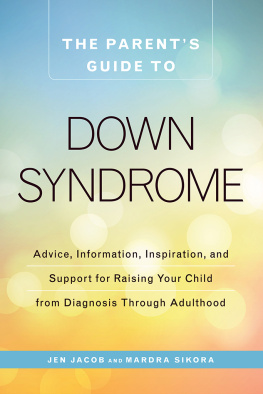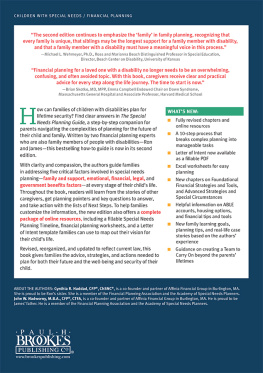Thank you for buying this Different Not Less e-book.
To receive special offers, bonus content, and info on new releases and other great reads, sign up for our newsletters.
Visit us online at
www.differentnotless.us
The author and publisher have provided this e-book to you for your personal use only. You may not make this e-book publicly available in any way. Copyright infringement is against the law. If you believe the copy of this e-book you are reading infringes on the authors copyright, please notify us at https://differentnotless.us/pages/piracy.
To Nathan for Everything.
You are my Life!
Chapter 1
Introduction
The Challenges Involved In Raising Children with Special Needs in an Unfriendly World
The topic of parenting has undoubtedly garnered a lot of attention over the years. One of the biggest challenges in this sphere centers on parenting a child/children with special needs. This is no simple role at all, which is why many families struggle with the commensurate challenges that accompany the process of parenting children with special needs.
These challenges, whether natural or made-made, can be the defining factor that brings happiness for parents, their children with special needs, or their utter misery. And over the years, these same challenges have led to a handful of discouraged parents and children alike, huge struggles for affected families to lead normal lives, and the inability of society to homogenously integrate them effectively, amongst many other unpleasant results.
Amongst these many challenges, which we will look closely at later, is the challenge of parents securing the best care and future for the lives of their children with special needs in an event where they are no longer available to do so themselves. It is unimaginable for most parents to think of what the life of their wards would be like when they are no longer alive. For the parents of children with special needs, there is often a nagging belief that their wards would be left helpless in a world filled with so much chaos, with nothing or no one to turn to.
Looking at the efforts that governments of nations around the world have and are putting in place, all geared at providing care and protection for children with special needs, there is so much to be desired. Granted, a handful of nations have taken deliberate steps to ensure that parents who are responsible for children with special needs receive some kinds of benefits in terms of education grants, tax relief, social amenities, and the like; still others, through the instrument of legislation, have gone further to enact laws that serve to recognize, emphasize, and protect the rights of children with special needs, some examples being the United States of Americas Individuals with Disabilities Education Act (IDEA), 2004 and the United Kingdoms Children and Families Act, 2014. But taking a quick glance at the broad spectrum, one would notice that these efforts do not cut evenly across the board and are barely enough to effectively offer the much-needed cover they require. With some countries having little or no laws enacted in this regard and doing nothing in particular to support either the parents or the primary caregiver of children with special needs residing with them, it paints a very bleak picture with respect to the future of these children.
It is a fact that parents/guardians are keen on affording the best for their child/ward with special needs. According to the statistics gotten from the MetLifes survey titled 2005 The Torn Security Blanket: Children with Special Needs and the Planning Gap, and the 2011 Torn Security Blanket Study1, about 69 percent of families admit growing and serious concerns about their abilities to afford lifetime support for their wards with special needs, and these concerns extend to the boundaries of thoughts of what would become of their wards when they die.
Furthermore, 88 percent of parents catering to children with special needs have not at any time established any form of trust aimed at preserving eligibility for their child with special needs when it comes to essential benefits such as Medicaid and complementary social income; in the last two decades, on the other hand, there has been a noticeable spike in the number of special needs trusts established by various caregivers, growing by an impressive 21 percent, effectively doubling the figures recorded back in 2005.
Again, figures indicating the number of caregivers who have neither written nor signed a letter of intent delineating an arrangement for the future care of the child with special needs stayed at 84 percent, with 72 percent not designating or naming any trustee to manage their childs estate in the event of the parents passing. Furthermore, 56 percent admitted their ignorance on the subject and wherewithal of identifying and naming a trustee to look over the financial holdings of their dependent in the future.
While two decades ago, only 53 percent had not named a guardian for their child, the number has slightly improved today to 49 percent. Still, about 59 percent of caregivers admit that they have little or no information about the financial assistance at their disposal, either on the subject of benefits and support delivered by state agencies or on legal steps for securing the future of their wards; in fact, 55 percent believe that this information is extremely hard to find.
Further surveys also revealed that 33 percent of parents spend time, which could be equated to a full-time job, taking care of their child with special needs; about forty hours per week on an average. Coupled with such an enormous amount of hours is the fact that these parents of children with special needs typically spend $326 per month, which amounts to about $4000 per year on unbudgeted medical expenditures to cater for their child with special needs.
Finally, it was also noted that 38 percent of caregivers have penned down a will, which is quite good compared to two decades ago, when the figures only stood at 32 percent. And for those who went further to set up future housing plans for their wards, the numbers stood at 36 percent, going up from 31 percent two decades ago.
These statistics clearly indicate that while some level of progress has been made in the last couple of years, there needs to be concerted effort between various governmental and social stakeholders in securing the future of children with special needs.
(a) Children with Special Needs
A child with special needs is an adolescent that has been understood to have a need for special devotion and specific requirements that other children do not need. Typically, such a status is declared by the state with the singular resolve of proposing benefits and support for the childs general growth and development. The term Special needs can likewise carry a legal connotation or designation, principally in the fostering and adoption care community. Here, the parent, caregiver, or guardian gets provisions geared at supporting them in leading dynamic lives.
By sheer definition and covering the subject of diagnostics, special needs is a blanket term. Its scope can stretch to a range which captures challenges that may last for life, others that may be comparatively mild, and those that are best described as profound. It captures within it medical challenges, developmental delays, psychiatric disorders, and hereditary illnesses that necessitate continuous support so that the child with special needs can attain their best potential.
Notable Points
- The characterization of special needs in reference to a child takes account of an extensive multiplicity of conditions, which may include corporal infirmities, learning disabilities, and life-threatening diseases.
- Parents and primary caregivers of children with special needs typically get some form of supplementary tax credit or deduction to help offset the added expenses and struggles that accompany giving care to children with special needs.
Next page






